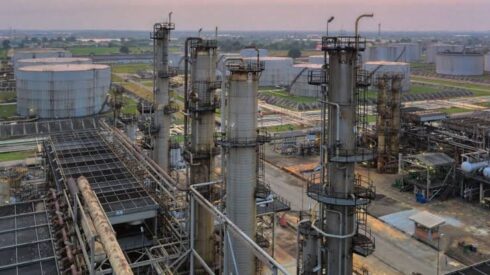On Wednesday, August 14, in Malabo, President Bola Tinubu of Nigeria and President Teodoro Obiang Nguema Mbasogo of Equatorial Guinea signed a landmark agreement that could reshape the energy dynamics of West Africa. The agreement, centered on the Gulf of Guinea Pipeline Project, covers legislative and regulatory frameworks, the establishment and operation of the pipeline, and the transit and ownership of natural gas. This strategic initiative aims to capture stranded gas off the coast of Akwa Ibom in Nigeria and channel it to the Punta Europa LNG plant on Bioko Island, Equatorial Guinea. While this project offers immense potential, a closer examination of its implications is necessary.
Unlocking Nigeria’s Gas Reserves
The Gulf of Guinea Pipeline Project holds the promise of transforming Nigeria’s energy sector by tapping into its vast natural gas reserves. According to energy economist Dr. Adewale Adeoye, “Nigeria possesses enormous gas reserves, which, if properly harnessed, can be a catalyst for economic growth and development.” The pipeline is envisioned as a critical infrastructure that will facilitate the export of this abundant resource to global markets, providing a much-needed boost to the country’s economy.
This project aligns with President Bola Tinubu’s broader economic vision of reducing Nigeria’s dependence on crude oil exports. By diversifying the nation’s energy portfolio and expanding its natural gas exports, Nigeria can mitigate the risks associated with the volatile global oil market. This strategic shift is not only about economic diversification but also about enhancing the country’s economic resilience in the face of global energy market fluctuations.
Economic and Employment Opportunities
Beyond the direct economic benefits of exporting natural gas, the Gulf of Guinea Pipeline Project is expected to have a significant impact on job creation in Nigeria. The construction and operation of the pipeline are anticipated to generate a wide range of employment opportunities. As Kabir Bala, an expert in energy policy, notes, “The pipeline’s construction and operation will create jobs across the value chain, from engineering and construction to logistics and support services.” This is particularly vital for Nigeria’s youth, who face one of the highest unemployment rates in the world.
The project’s ability to generate employment extends beyond immediate construction jobs. It promises long-term employment in areas such as pipeline maintenance, gas processing, and related industries. This potential for job creation is crucial for addressing Nigeria’s unemployment challenge and ensuring that the benefits of the pipeline project are felt across different sectors of the economy.
Challenges and Strategic Considerations
While the Gulf of Guinea Pipeline Project is promising, it is not without its challenges. The project will require substantial financial investments, robust regulatory frameworks, and international cooperation to succeed. Additionally, there are concerns about the environmental impact of the pipeline, particularly in coastal regions where communities may be affected by construction activities and potential spills.
Moreover, the geopolitical implications of the pipeline cannot be ignored. The Gulf of Guinea is a region with complex security dynamics, including piracy and territorial disputes. Ensuring the security of the pipeline and the safe transit of gas will be critical to the project’s success. The Nigerian government, in collaboration with Equatorial Guinea and other stakeholders, will need to address these challenges through comprehensive planning and strategic partnerships to ensure that the project delivers on its promise of transforming Nigeria’s energy landscape.
The Gulf of Guinea Pipeline Project stands as a potential game-changer for Nigeria. It offers a pathway to unlock the country’s vast gas reserves, diversify the economy, and create jobs. However, careful planning, investment, and international cooperation will be essential to overcome the challenges and realize the full potential of this ambitious project.
Potential Challenges
As Nigeria embarks on this ambitious gas pipeline project, several potential challenges and uncertainties must be acknowledged to ensure its success. Environmental impact assessments are paramount to mitigate potential harm to ecosystems and communities along the pipeline route. Dr. Modibo Saliu, an esteemed environmental scientist, emphasizes the importance of these assessments, stating, “Rigorous environmental impact assessments and robust mitigation measures are essential to protect biodiversity and local livelihoods.” Without these precautionary measures, the project could face significant opposition from environmental groups and local communities, which could delay or derail progress.
Security concerns also warrant serious attention, given the Gulf of Guinea’s history of maritime piracy and regional instability. The region has long been a hotspot for criminal activities, which could pose a significant threat to the pipeline and its personnel. Robust security measures will be crucial to safeguard this critical infrastructure. President Tinubu has already hinted at this need, saying, “Instead of the crisis and conflicts that we see in the Republic of Congo and others, we have to look inwards to solve problems ourselves.” Ensuring the safety of the pipeline will not only protect investments but also build confidence among international stakeholders.
Maximizing the Project’s Potential
To fully capitalize on the benefits of this landmark gas project, Nigeria must strategically position itself in the global gas market. This requires significant investments in gas processing infrastructure, which will enable the country to add value to its natural resources before export. Additionally, developing a skilled workforce capable of operating and maintaining this infrastructure is essential. Fostering a conducive business environment to attract foreign investment will further enhance the project’s success. As President Mbasogo of Equatorial Guinea noted, the signing of this agreement holds strategic significance for Africa’s development, underscoring the project’s potential to transform Nigeria’s energy sector.
By addressing the identified challenges and building on the project’s strengths, Nigeria has a unique opportunity to emerge as a major player in the global gas market. The project’s financial viability and economic impact also require careful analysis. Dr. Adeoye, a renowned economist, cautions that “while the potential benefits are significant, the project’s success hinges on factors such as gas prices, infrastructure development, and regulatory frameworks.” Strategic planning and careful execution will be key to ensuring that this project not only meets its goals but also sets a new standard for energy projects in the region.
Table of Contents
Discover more from OGM News NG
Subscribe to get the latest posts sent to your email.













